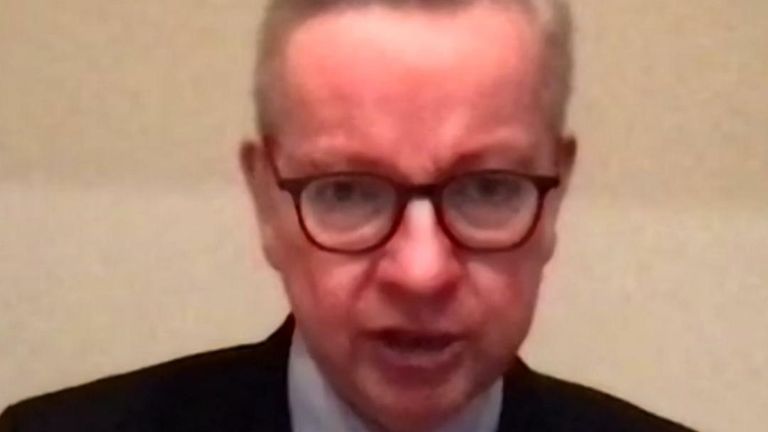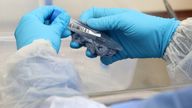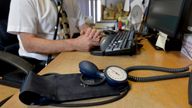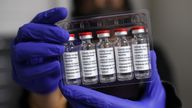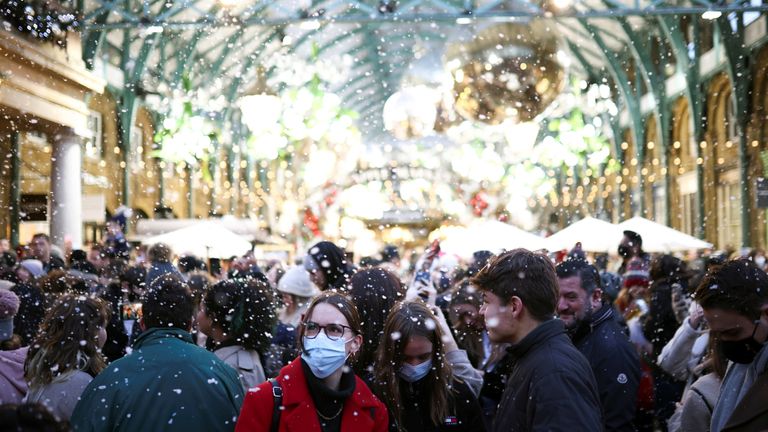COVID-19: UK govt to keep 'restrictions under review' after 'very challenging new information' on Omicron, says Gove
Michael Gove headed the talks with the first ministers and deputy first ministers of Scotland, Wales and Northern Ireland to discuss COVID-19 data and coordination on the response.
Friday 10 December 2021 23:49, UK
COVID restrictions across the UK will be kept "under review" after the government was presented "with some very challenging new information" about Omicron, Michael Gove has said.
Mr Gove was speaking after leading a COBRA emergency meeting with the first ministers and deputy first ministers of Scotland, Wales and Northern Ireland to discuss COVID-19 data and coordination on the response.
The minister for intergovernmental relations, who is isolating after coming into contact with Australia's deputy prime minister, said: "We know that we have the highest number of COVID infections across the United Kingdom recorded today, since 9 January."
Live COVID updates from the UK and around the world
"We know that the Omicron variant is doubling every two to three days in England, and possibly even faster in Scotland.
"We knew that 30% of reported cases in London are the Omicron variant. And of course, we only identified the Omicron variant in this country a fortnight ago.
"So, we absolutely do need to keep everything under review."
Gove avoids talking about 'Plan C' as cases rise
Mr Gove said the government's approach is "proportionate" and he recognises the "importance of balancing people's ability to get on with their lives with a need to protect against this virus".
However, he added: "Action is absolutely required, and as new data comes in, we will consider what action we do require to take in the face of that data."
Figures show 448 new Omicron cases were recorded in the latest 24-hour period - nearly double the previous day - taking the total to 1,265.
There were 443 infections in England, one in Scotland and four in Wales during the latest period.
Plan B: What are the new restrictions?
Mr Gove avoided talking about whether a "Plan C" will be brought in as more than 50 Conservative MPs have said they will vote against the government's vote next week to bring in Plan B restrictions, with many concerned that will open the floodgates for further restrictions.
Tory MPs to rebel on Plan B vote next week
Chris Green, a regular critic of COVID rules, is one of the latest Tory MPs to declare he will vote against the rules, which include introducing vaccine passports for large events.
"I am concerned the government is using them as a stepping stone to implement a harsher 'Plan C' in the New Year," he said.
Plan B means people in England have to wear face coverings in most indoor spaces, including hospitality, the work from home guidance has returned and NHS COVID passes are required to enter large events.
Follow the Daily podcast on Apple Podcasts, Google Podcasts, Spotify, Spreaker
Earlier on Friday, the Health Security Agency said the UK could have more than one million cases of Omicron by the end of the month if current trends continue unchanged.
Scotland's first minister Nicola Sturgeon has predicted that a new wave of the pandemic is about to begin as she tightened COVID restrictions and urged people to cancel Christmas work parties.
From Saturday, all household contacts of any COVID cases should isolate for 10 days, regardless of vaccination status and even if they initially get a negative PCR test.
Non-household contacts can leave isolation if they receive a negative PCR test and are double jabbed.

